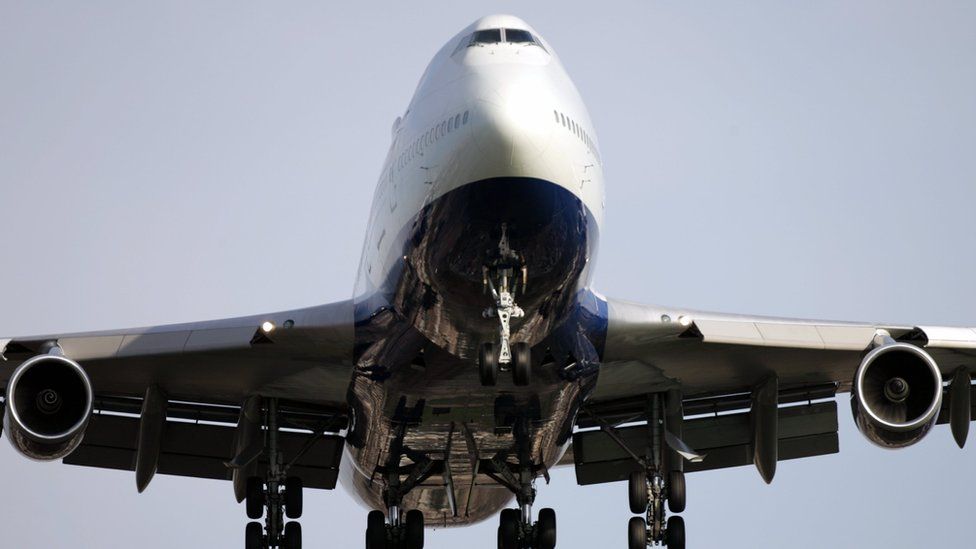Climate change 'to make transatlantic flights longer'
- Published

Flights from the UK to the US could take longer due to the changes in the climate, according to a new study.
Global warming is likely to speed up the jet stream, say researchers, and slow down aeroplanes heading for the US.
While eastbound flights from the US will be quicker, roundtrip journeys will "significantly lengthen".
The University of Reading scientists believe the changes will increase carbon emissions and fuel consumption and potentially raise ticket prices.
The study has been published in the journal Environmental Research Letters.
Speedy streams
High altitude jet streams in the northern and southern hemisphere are the powerful winds that help move weather systems around the globe.
Air traffic normally tries to take advantage of these speedy flows of the Atlantic jet stream from west to east to reduce journey times on routes between Europe and North America.
This is one of the world's busiest routes with around 600 flights every day.
Previous studies have shown that climate change is likely to increase turbulence on these transatlantic flights. In this new study researchers modelled how atmospheric winds would change given a doubling of atmospheric CO2.
They fed the results into the same route algorithms that airlines routinely use to plan their transatlantic journeys.
They found that the winds on the New York to London route will become 15% faster on average.
Flights from London will become twice as likely to take over seven hours while flights from New York will speed up and will become twice as likely to take under five hours and 20 minutes.
While on average, flights will only gain and lose a few minutes each way, the cumulative impact is "significant" says the study.
"If you look at the round trips, the eastbound flights are getting shorter by less than the westbound flights are getting longer," lead author Dr Paul Williams from the University of Reading told BBC News.
"So there is a robust increase in the round-trip journey time, which means planes spending longer in the air, when you add that up for all transatlantic aircraft you get an extra 2,000 hours of planes in the air every year, with $22 million extra in fuel costs and 70 million kg of CO2."
The researchers say the extra CO2 is the equivalent of the annual emissions of 7,000 British homes.
Carbon cost of flying
- In 2012, 2% of all human carbon emissions were result of plane emissions.
- If air travel continues to grow at the predicted rate, it could contribute a considerably higher proportion by 2050.
Blowing hot and cold
While at present there is no firm observational evidence of changes in the jet stream, scientists point to the fact that the record time for a non-Concorde flight from New York to London is currently 5 hours and 16 minutes, set in January last year.
"We know what drives the jet stream, it's the temperature difference between the warm tropical regions and the cold polar regions at flight levels," said Dr Williams.
How jet stream could make UK-US return flights longer
"We understand what that temperature difference is going to do in response to global warming, it's increasing, we are very confident that the jet stream is increasing as a consequence."
The researchers believe that as well as worsening the environmental impacts of aviation, airlines are likely to increase ticket prices to cover their costs.
And while the study only applied to the London-New York route, the impacts on flights of changes in the jet streams are likely to be felt all over the world as these critical winds are found in both the northern and southern hemispheres.
Other scientists in this field welcomed the study.
"This study builds on the concept that my team published last year showing that there is a two-way relationship between climate change and air travel," said Dr Kristopher Karnauskas, from the University of Colorado, Boulder.
"I think these results are an important step forward in filling in the overall puzzle that is this intricate relationship that we humans have with the climate system."
Dr Gregor Leckebusch from the University of Birmingham said the study was sound and the findings were easy to comprehend.
"My meteorological basic instinct would exactly have predicted such a result (shorter eastbound times while longer westbound times), but it is difficult to quantify the net effect without a detailed study using a conceptual model and detailed computational efforts," he said.
Follow Matt on Twitter and on Facebook.